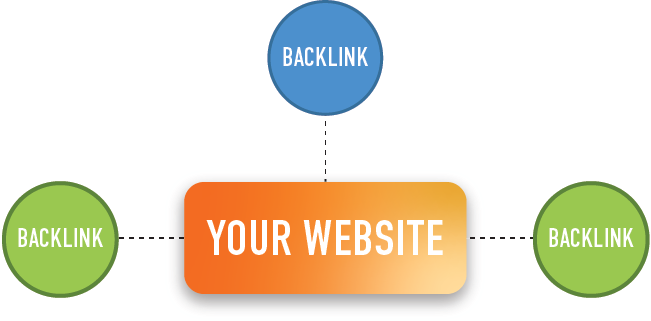If you’re reading this, you already deserve a pat on the back because backlinking is a part of SEO that most people groan about. And because it’s the way Murphy’s Law goes, it’s also one of the most critical parts of SEO.
We tackled Link Building 101 in a previous blog by taking a look at some simple ways you can get links to your site.
For a recap, backlinking is one website linking to another website. It’s like earning a vote that positions your site as a credible and reliable source of whatever it is you’re providing.
In this blog, we want to break down why backlinks are important for SEO.
But let’s keep something in mind as we go through this: Backlinking can be done well and backlinking can be done poorly.
Like a Thai monk once told me when I asked him why there are monks who smoke, drink, and have sex while claiming to lead ascetic lives, he said, “just like people, there are good monks and there are bad monks” (I’ll stick a sic in here because monks are still people).
In SEO, there are white hats and black hats. Most of us land somewhere in the gray area, but essentially, white hat tactics are going to give you better, more sustainable, long-term results, especially when it comes to backlinking.
The moral? Don’t be a bad monk. And, take the honest route to gaining backlinks. At Logical Mix, we’re coining that route Backlinking-Done-Right.
What is Backlinking-Done-Right?
To start (with an embedded hint), we’ll share the primary reason backlinks are so important for your business:
According to MOZ, out of 200 possible influences, backlinks are the number one factor that affects ranking.
Wondering what we meant by embedded hint? That info came from MOZ, which is an SEO authority. We’ll get into what that means for backlinking and why it’s important.
But first––
Backlinking-Done-Right has three main purposes:
- It generates more relevant traffic to your page
- It shows you’re part of a community, which helps establish trust
- It helps Google recognize you as a credible source of information and therefore, it improves your rank in the SERPs
That doesn’t mean that you want to get any and all backlinks to your site. Quality stands above quantity. Remember the monks? There are good backlinks and there are bad backlinks. Spammy links and irrelevant links don’t just not help you, Google can actually penalize you for it.

What influences your chances of ranking when it comes to backlinks?
According to Neil Patel (an authority):
- How many links you have
- How many links you get over time (demonstrates a natural progression)
- How related those websites are to yours to determine relevance
- Domain authority (what that means below)
What are the features of high-quality backlinks?
- Domain authority (DA) shows that an authority supports you, which influences traffic
- Relevance deals with the same subject matter or niche as your site
- Traffic means they have a large number of visits, social media presence, and active followers (for example, a blog)
- Uniqueness means authority sites link to your page and not your competitors’
There are some general characteristics and some overlap with what influences your ranking chances. But there is a main difference, as there is in many aspects of life: the what and the how. The two can work in tandem and they can sometimes produce very different results.
For example, I can have lots of links from highly-credible sources (the What) but if I gained them all overnight (the How), it looks a bit shady and it might appear to Google that I paid for those links (black-hat tactic).
See the difference?
Here’s another example:
Perhaps I gained all my backlinks over time, naturally, by way of a link-building campaign, but it wasn’t so well thought-out so I ended up with 79 crappy, spammy, irrelevant backlinks pointing to my site. (But obviously, if you’re investing time in a campaign you’re going to be choosy about what sites you’re reaching out to).
Weed Out The One Hit Wonders
In MOZ’s 2019 study of link-building as a ranking factor, both Domain Authority (DA) and Page Authority (PA) scores combined were a stronger indicator of ranking potential than the number of links.
DA evaluates the predictive ranking strength of an entire page.
PA evaluates the strength of individual pages on a site.
When we interpret this finding, quality stands out in a couple of different ways.
First, DA and PA combined indicate that a link’s authority depends on both factors. A site may have one page that randomly ranks really well for a specific keyword (kind of like a one-hit-wonder band) but have a low DA. It’s not bad to have that page linking to your page, it’s just that there are better links out there that beat both metrics.
While both are important when it comes to evaluating quality backlinks, Google does not use DA as a ranking metric, and it has no effect on the SERPs.
Jumping back to the authority hint I mentioned near the beginning, an authority link is super valuable because it means that a highly-credible source thinks your site or page is great. It means they voted for you.

What is Link Earning?
Remember that give-a-man-a-fish, teach-a-man-to-fish adage? Link earning is a bit like that.
Whereas with link building you can acquire links easily, link earning is a bit more involved.
If an authority just gives you a link because you asked for it, that’s great and obviously you’ll use it, but they don’t all come that easily.
Link earning has greater staying power because it establishes trust in the name of fair exchange. You offer something to another site owner, not just in exchange for a link, but because you want to contribute something of value community to which you belong.
You build your reputation as a fair player with a strong work-ethic and everyone respects those guys. As a bonus, you get a high-quality backlink.
It aligns with teaching a man to fish because as he learns his power to draw on his inner resources (his fishing skill), he is able to feed himself his whole life long. You do the same with link earning.
Round-up posts are an example of a great link-earning strategy from Neil Patel:
Email every expert in your niche, asking them the same question about a hot topic. Then write a blog showcasing their responses. Email the participants and ask them to share it on their favourite social network.
BOOM.
Here’s another:
A website that links employers of schools with English teachers searching for international teaching jobs needs links to build a database of teachers.
Where is the best place to find teachers looking for a unique international experience? Fourth year university.
So the site owner contacts every university across the country offering its students the chance to win a scholarship. All they have to do to qualify is register for a free teacher profile and write a 500 word essay on why they want to teach abroad.
Two winners are chosen each semester and receive a $250 scholarship. In the meantime, the site now has dozens (or hundreds) of universities (often authority sites) pointing to it.
Another BOOM.
There’s some creativity required in link earning. The man who was taught to fish had to learn and learning can be a bit painful sometimes.
But you’ve got this. You’re going to be a master in Backlinking-Done-Right.
But if you need some help acquiring the right links, just us a shout here.
Logging out,
Logical Mix



